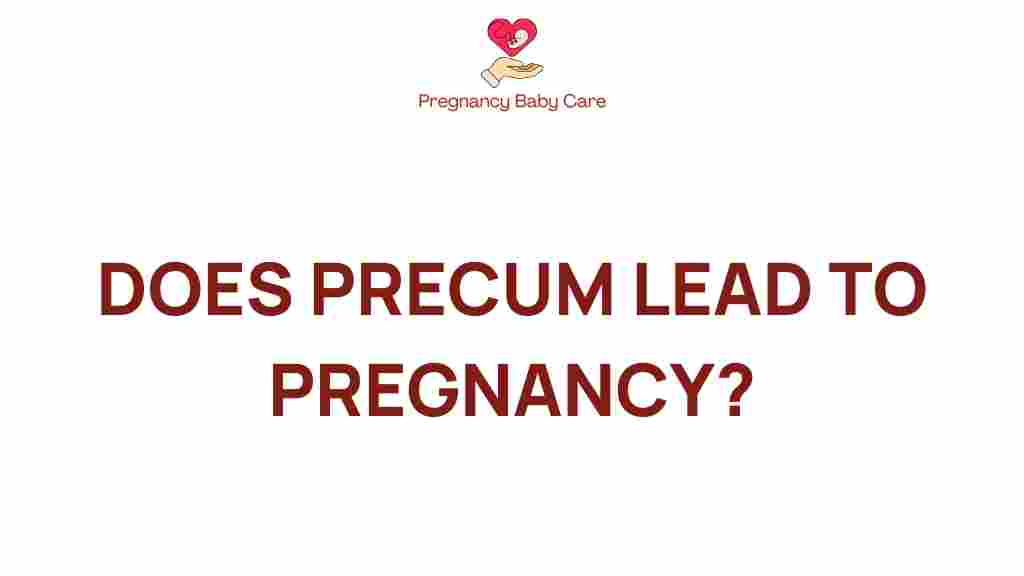Does Precum Lead to Pregnancy? The Surprising Truth Revealed
Understanding the complexities of human sexuality is essential for maintaining good sexual health. One common question that arises is, “Does precum lead to pregnancy?” This concern stems from many myths surrounding fertility, contraception, and reproductive health. In this article, we will explore the truth about precum, its potential to cause pregnancy, and the implications for sexual health and awareness.
What is Precum?
Precum, also known as pre-ejaculate fluid, is a clear fluid that is released from the penis during sexual arousal, prior to ejaculation. This fluid is produced by the Cowper’s glands and serves a few important functions:
- Lubrication: It helps to lubricate the urethra and neutralize acidity in the urethra, preparing it for sperm passage.
- Protection: It can help protect sperm as they travel through the urethra by clearing out any residual urine, which may be acidic.
The Role of Sperm in Precum
One of the significant concerns regarding precum is whether it contains sperm. Research indicates that while precum itself is not a reliable source of sperm, it is possible for sperm to be present in the fluid. This can occur in the following scenarios:
- If a man has recently ejaculated and there are residual sperm in the urethra, some may be carried out with the precum.
- In some cases, sperm may be present in small amounts even if the man has not recently ejaculated.
Can Precum Lead to Pregnancy? Understanding the Risks
The question of whether precum can lead to pregnancy is nuanced. Here are the key points to consider:
- Low Probability: While it is possible for precum to contain sperm, the concentration is typically much lower than in ejaculate. Therefore, the chances of pregnancy occurring from precum alone are relatively low.
- Timing: Pregnancy is most likely to occur during a woman’s fertile window, which is when she ovulates. Engaging in sexual activity during this time increases the risk of pregnancy, even if ejaculation does not occur.
- Contraceptive Measures: If proper contraception is not used, the risk of pregnancy increases, as there is no guaranteed way to prevent sperm from reaching the egg.
Myths About Precum and Pregnancy
Many myths circulate regarding precum and its potential to cause pregnancy. Here are some common ones:
- Myth 1: Precum always contains sperm.
- Myth 2: You cannot get pregnant if there is no ejaculation.
- Myth 3: The pull-out method is a reliable contraceptive method.
It is crucial to debunk these myths to foster better sexual health awareness. Education can empower individuals to make informed decisions regarding their reproductive health.
Awareness and Sexual Health
Understanding the facts about precum and its potential role in pregnancy is essential for sexual health. Here are some tips for increasing awareness:
- Educate Yourself: Learn about human reproduction, fertility, and contraceptive methods.
- Communicate: Have open discussions with partners about sexual health and contraception.
- Consult Professionals: Speak with healthcare providers for personalized advice on reproductive health.
Contraception and Precautions
For those who are sexually active and wish to prevent pregnancy, understanding contraception methods is vital. Here are some effective options:
- Condoms: Barrier methods provide protection against both pregnancy and sexually transmitted infections (STIs).
- Birth Control Pills: Hormonal contraceptives can prevent ovulation and make it less likely for pregnancy to occur.
- IUDs: Intrauterine devices are a long-term solution for preventing pregnancy.
- Emergency Contraception: Options are available if contraception fails or is not used.
For more information on contraception, visit Planned Parenthood.
Step-by-Step Process: How to Prevent Pregnancy
Here’s a simple step-by-step guide to ensure you take the necessary precautions during sexual activity:
- Educate Yourself: Learn about your body, fertility cycles, and the options available for contraception.
- Choose Your Method: Decide on the most suitable contraceptive method for you and your partner.
- Communicate: Discuss contraception and sexual health openly with your partner.
- Use Protection: Always use condoms or other contraceptive methods consistently and correctly.
- Monitor Your Cycle: Understand your menstrual cycle to identify fertile days.
- Seek Professional Advice: Consult healthcare providers for personalized recommendations.
Troubleshooting Common Concerns
Despite the best precautions, concerns about potential pregnancy may arise. Here are some troubleshooting tips:
- Missed Period: If there’s a missed period, consider taking a pregnancy test and consulting a healthcare professional.
- Unprotected Sex: If unprotected sex occurs, consider emergency contraception if within the appropriate time frame.
- Contraceptive Failure: If a contraceptive method fails, consult a healthcare provider for next steps.
Conclusion: The Importance of Awareness in Reproductive Health
In summary, while precum can theoretically lead to pregnancy, the chances are low. It is essential to understand the role that sperm plays in precum and to debunk common myths surrounding sexual health and fertility. By taking an active role in education and awareness, individuals can make informed decisions regarding their reproductive health. Always prioritize communication with partners and consult healthcare professionals for personalized advice.
Remember, being proactive about sexual health is the best way to prevent unintended pregnancies and maintain overall reproductive well-being. For more information on sexual health, visit CDC Reproductive Health.
This article is in the category Pregnancy and created by PregnancyBabyCare Team
